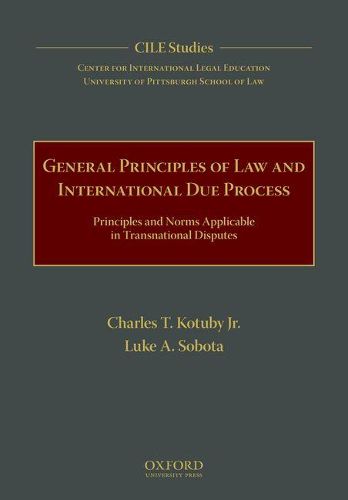Readings Newsletter
Become a Readings Member to make your shopping experience even easier.
Sign in or sign up for free!
You’re not far away from qualifying for FREE standard shipping within Australia
You’ve qualified for FREE standard shipping within Australia
The cart is loading…






Article 38 of the Statute of the International Court of Justice defines international law to include not only custom and convention between States but also the general principles of law recognized by civilized nations within their municipal legal systems. In 1953, Bin Cheng wrote his seminal book on general principles, identifying core legal principles common to various domestic legal systems across the globe. This monograph summarizes and analyzes the general principles of law and norms of international due process, with a particular focus on developments since Cheng’s writing. The aim is to collect and distill these principles and norms in a single volume as a practical resource for international law jurists, advocates, and scholars. The information contained in this book holds considerable importance given the growth of inter-state intercourse resulting in the increased use of general principles over the past 60 years.General principles can serve as rules of decision, whether in interpreting a treaty or contract, determining causation, or ascertaining unjust enrichment. They also include a core set of procedural requirements that should be followed in any adjudicative system, such as the right to impartiality and the prohibition on fraud. Although the general principles are, by definition, basic and even rudimentary, they hold vital importance for the rule of law in international relations. They are meant not to define a rule of law, but rather the rule of law.
$9.00 standard shipping within Australia
FREE standard shipping within Australia for orders over $100.00
Express & International shipping calculated at checkout
Stock availability can be subject to change without notice. We recommend calling the shop or contacting our online team to check availability of low stock items. Please see our Shopping Online page for more details.
Article 38 of the Statute of the International Court of Justice defines international law to include not only custom and convention between States but also the general principles of law recognized by civilized nations within their municipal legal systems. In 1953, Bin Cheng wrote his seminal book on general principles, identifying core legal principles common to various domestic legal systems across the globe. This monograph summarizes and analyzes the general principles of law and norms of international due process, with a particular focus on developments since Cheng’s writing. The aim is to collect and distill these principles and norms in a single volume as a practical resource for international law jurists, advocates, and scholars. The information contained in this book holds considerable importance given the growth of inter-state intercourse resulting in the increased use of general principles over the past 60 years.General principles can serve as rules of decision, whether in interpreting a treaty or contract, determining causation, or ascertaining unjust enrichment. They also include a core set of procedural requirements that should be followed in any adjudicative system, such as the right to impartiality and the prohibition on fraud. Although the general principles are, by definition, basic and even rudimentary, they hold vital importance for the rule of law in international relations. They are meant not to define a rule of law, but rather the rule of law.